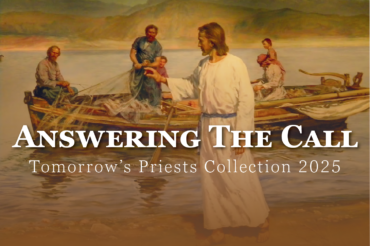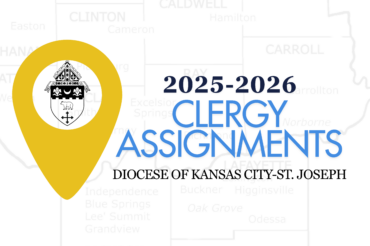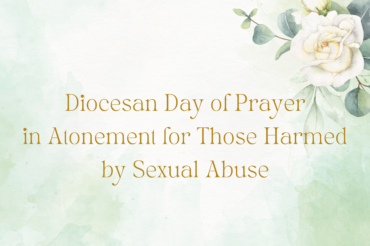On Wealth and Brotherhood
Photo (detail): The Parable of the Rich Man and Lazarus – Engraving after Sir John Everett Millais, 1864.

God’s Word in Everyday Living
Marc Cardaronella
Will money condemn you? This week’s gospel reading, the parable of the Rich Man and Lazarus (Luke 16:19-31) seems to say that. I admit to feeling a bit of delicious righteousness when I hear this parable. This is the “make your poverty feel better” parable. When I get jealous of rich people with fancy stuff, or super talented people who do everything right, I think about this parable. “See,” I say to myself. “You’re getting your reward now, but I’ll get mine later in heaven.” Not that I’m as poor and sick as Lazarus. Perhaps there’s people in real poverty saying the same thing about me. But is that really what’s going on here? Is Jesus condemning riches and giving most of us “middle-classers” a satisfying hope of comeuppance? Probably not. Let’s dig deeper.
First, I want to point to the doctrine of the Particular Judgment. Everyone is judged immediately after death and rewarded, or punished, according to their faith and how they lived. Don’t confuse this with what we profess in the Nicene Creed—that Christ “will come again to judge the living and the dead and his kingdom will have no end.” That refers to the Last Judgment at the end of time. In this parable you see that individual judgment takes place right away and you go where you’re meant to go for all eternity—heaven (probably by way of purgatory) or hell. Boom! Just like that. Lazarus goes to a place of comfort and peace, the rich man to a place of torment and anguish. This is not Heaven and Hell…not yet. It can’t be because Jesus hasn’t yet opened the way to heaven by his saving sacrifice. Lazarus goes to “Abraham’s bosom.” This is another name for the Jewish place of afterlife, “Sheol” or the “Abode of the Dead.” It’s a place where the righteous awaited Christ’s redemption with blessed hope. Christ descended into this place after his death and before his resurrection to free these holy inmates and escort them to heaven. The rich man goes to Hades, which technically is not Hell although it doesn’t seem much better. Since they both have contact with Abraham, it’s possible this is also the waiting place…with previews of what’s to come. Nevertheless, there is a separation that can’t be bridged so no one is sneaking into the Bosom of Abraham from Hades…at least not if Abraham has anything to say about it.
Second, this parable teaches the inherent dignity of every person. Lazarus, poor and destitute, disgusting and full of sores, is still a human person and therefore of infinite worth. He’s not attractive or popular. He’s not influential. He doesn’t contribute much to society. He doesn’t have a huge social media following or tons of likes on Facebook. He’s nothing in society’s view. The refuse. An outcast reduced to begging on the street and even that doesn’t sustain him. But obviously he has a good heart and loves God. Every human person has dignity and worth in God’s eyes, as well as every Christian who sees with God’s eyes. Our worth is immeasurable despite the world’s appraisal, because we’re made in God’s image. We are all lovely because God loves us. We are worthy because God finds worth enough in us to die for. Our worth doesn’t depend on our beauty, talent, intelligence, wealth, power, or influence in the world. It’s not measured by what we do, but who we are inherently as sons and daughters of the Father.
So, what brought the rich man to such low estate after his death? Was it his wealth? Was it because he was rich and had tons of possessions? I don’t think so. Jesus never condemns wealth or the mere possession of goods. However, he has harsh things to say about those who are selfish and don’t think about others. The rich man is condemned because he fails to pay attention to Lazarus’ needs. Here is a man sick and starving to death right outside his door and he can’t even bother to give him the leftover food he throws out in the garbage. Never mind having to go out of his way to find someone to help. He literally steps over this guy every morning. No doubt he hates having to smell Lazarus when he passes him and wishes he was dead.
Are you your brother’s keeper? You bet you are! Pope St. John Paul II commented on this parable saying, “Riches and freedom create a special obligation. And so, in the name of the solidarity that binds us all together in a common humanity, I again proclaim the dignity of every human person: the rich man and Lazarus are both human beings, both of them equally created in the image and likeness of God, both of them equally redeemed by Christ, at a great price, the price of the ‘precious blood of Christ’ (1 Pet 1:19)” (John Paul II, Homily in Yankee Stadium, 2 October 1979).
So, will your riches condemn you? Probably not…but what you do with them might. Like it or not, we are all bound together. Our love for Jesus obliges us to love our neighbor as ourselves. You owe a debt of service to everyone you meet, which means looking out for their welfare and their needs. As well, you have a debt to help your brothers and sisters get to heaven. If your actions hinder that, you falter in your duty. Condemnation could ensue. If, however, your actions expedite another’s entry into blessedness, you in turn will be blessed. Something far greater than “Abraham’s bosom” awaits. How will you respond to the Lazarus’ you meet?
Marc Cardaronella is Director of the Office of Catechesis and Faith Formation.





